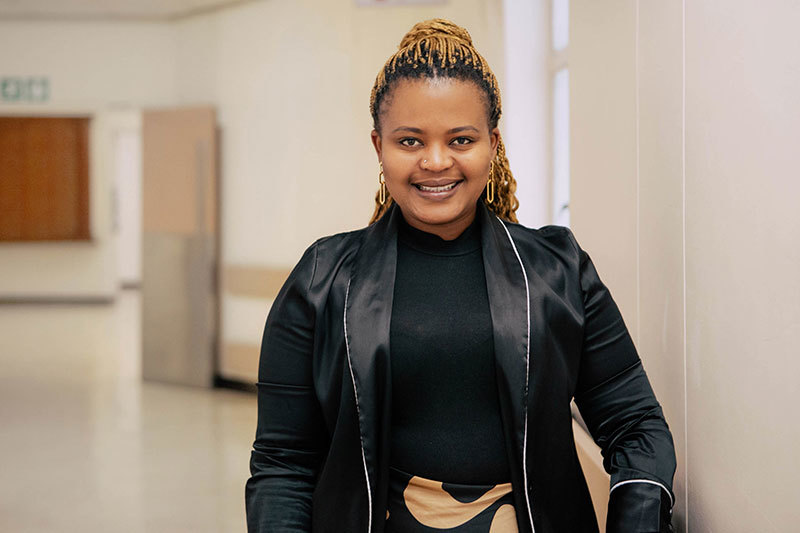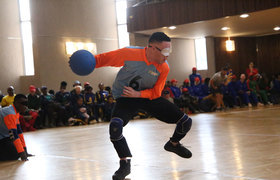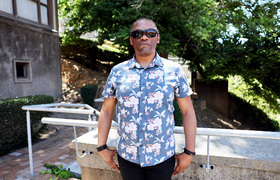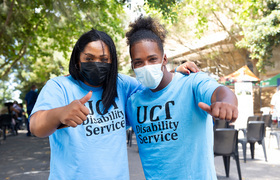Include people living with intellectual disabilities in SA’s policy development
01 December 2023 | Story Niémah Davids. Photo Robyn Walker. Read time 6 min.
South Africans living with intellectual disabilities must be included in multi-layer policy development and implementation processes that directly impact their lives and mental health. It offers agency and self-advocacy and is cornerstone to democratising systems and processes for this marginalised sector of society.
This was according to the University of Cape Town’s (UCT) Dr Babalwa Tyabashe-Phume, a postdoctoral research fellow in the Including Disability in Education in Africa (IDEA) unit – a research unit in UCT’s Department of Health and Rehabilitation Studies. Dr Tyabashe-Phume is determined to fast-track inclusion in public spaces for people living with intellectual disabilities and used her PhD research to get the wheels in motion. She graduated with her doctorate from the Department of Psychiatry and Mental Health in July, where she majored in intellectual disability.
Through her research, she developed a conceptual framework to ensure the voices of people living with intellectual disabilities are included in social and health-related policy priorities. To get the answers she needed, she studied and explored the views of a group of stakeholders, including participants with intellectual disabilities.
“People with intellectual disabilities are generally not consulted when policy makers develop and implement public policies that affect their lives.”
“People with intellectual disabilities are generally not consulted when policy makers develop and implement public policies that affect their lives. This is not a just process. I believe that people living with intellectual disabilities should exercise their democratic right to self-representation in public policy development and implementation processes. The right support structures should be put in place to enable this participation,” she said.
As the world prepares to observe International Day of Persons with Disabilities on Sunday, 3 December, which brings to a close National Disability Rights Awareness Month in South Africa, UCT News spoke to Tyabashe-Phume to get some insight into her work.
A first of its kind
Tyabashe-Phume’s research study is believed to be the first of its kind that explores the benefits and drawbacks of including people living with intellectual disabilities in policy development and implementation processes in the country.
Her research included input from those individuals who are in favour of being part of these multi-layer processes and those who are not. And considering the degree at which people with intellectual disabilities are marginalised in South Africa, and in society more broadly, she said the study provides a detailed, meaningful argument on why it’s essential to include their voices.
She also used her dissertation to suggest several strategies policy developers should adopt to get this right. One of these, she added, encourage policy makers to translate policy documents into easy-to-read formats to ensure accessibility and inclusivity. As a product of this study, she developed a conceptual framework to inform policy-related self-advocacy for adults with intellectual disabilities. The framework has since been converted into an easy-to-read booklet that both policy developers and potential participants can use as a reference and guideline.
“The findings bring attention to the fact that while there are contextual differences with regard to the experiences of people with intellectual disabilities in the South African context, their disempowerment, exclusion, and their striving for empowerment and respect for their rights, are fundamentally the same as those experienced by people with intellectual disabilities elsewhere in the world,” Tyabashe-Phume said.
Fast-tracking inclusion
Part of breaking down these barriers is ensuring that they feel welcome and included in public spaces. And as a result, her research incorporated the concept of ubuntu – an African philosophy that stresses the importance of interconnectedness among members of society.
“Findings from this study demonstrated that self-advocacy among people living with disabilities can be achieved through interdependence. It all forms part of a process through which people lacking an equal share of valued resources gain greater access to and control over those resources. It’s also a process by which people gain control over their lives and democratic participation in their communities,” Tyabashe-Phume said.
She has high hopes that her work will fast-track inclusion and believes that there’s no better place to start than at home. Her goal is to remove as many stumbling blocks for people with intellectual disabilities to help create inclusive and transformed spaces in their communities and other areas of public life.
“There is great need to address stigma and exclusionary attitudes, which affect people with intellectual disabilities. I hope the recommendations I’ve made in this study will be considered in various social environments within which people with intellectual disability live.”
Where to from here?
Her PhD has set the foundation for her postdoctoral research. Currently, Tyabashe-Phume is focused on using this research to develop an appropriate learning curriculum for learners with intellectual and development disabilities in South Africa. But where does it stem from? She said part of her PhD highlighted that most learners with intellectual and development disabilities are often excluded from mainstream education, and she wanted to use her postdoctoral research as a vehicle to change that. This work, she said, is already under way.
“Supporting people living with intellectual and development disabilities in as many ways as we can is important to help us create an equitable society.”
“Most learners with intellectual and development disabilities are excluded from mainstream education and when they are included, they’re usually met with an inappropriate or irrelevant curriculum. I intend to construct a strong evidence base for curriculum development in South Africa, to ensure inclusive and equitable education for learners with disabilities,” she said.
“Supporting people living with intellectual and development disabilities in as many ways as we can is important to help us create an equitable society where everyone feels recognised, welcomed and appreciated.”
 This work is licensed under a Creative Commons Attribution-NoDerivatives 4.0 International License.
This work is licensed under a Creative Commons Attribution-NoDerivatives 4.0 International License.
Please view the republishing articles page for more information.










